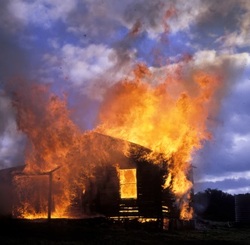
Yesterday I came face to face with a man who had lost his home in the Blue Mountains bushfires. His insurance had been paid in a week, including things he wasn’t even aware of such as 12 months’ rent. If only this was the status quo. He was a banker with quite a senior role for one of the majors, so no surprises he was adequately insured, but it sure does make you think.
For homeowners struggling to make ends meet, there are plenty of ways to reduce costs, but experts warn insurance shouldn’t be the first place to be looking to cut corners.
We are all concerned with saving money and it is important to shop around when looking for insurance coverage. However some people are reducing their coverage or dropping important coverage plans altogether to try to save money and this can leave you dangerously underinsured in the event of a disaster.
With the holiday season upon us it’s important to ensure your insurance policy is adequate and up to date. Summer is fire season, and the wet season approaches for those in northern Australia. Be aware that you can’t obtain insurance last minute once a cyclone has been named or once a fire is at your doorstep.
Here’s a look at 5 of the top mistakes home owners make when it comes to their home insurance.
Insuring For Real Estate Value Only
Homeowners often mistakenly insure their property for its real estate value instead of the actual cost to rebuild. When real estate prices go down, that enables them to reduce the amount of insurance on their home and save some money. This is in effect creating a type of false economics.
You should make sure that you have enough coverage to completely rebuild your home and replace your belongings. A better way to save is to raise the excess on your policy. An increase from $500 to $1,000 could save as much as 25% on your premium payments in some cases.
Not Ensuring Complete Cover
Natural disasters can happen with little to no notice and can have devastating consequences. For instance, flood insurance is almost always a nominated addition to most policies.
One of the most common mistakes that homeowners make is assuming that their policy covers their home and belongings in the event of every potential risk – such as flood. Sadly, many people find out the hard way after a major storm that they didn’t have the coverage that they truly needed. You must check to see what natural catastrophes are common in your area and make sure you are adequately covered.
Choosing A Policy On Price Alone
Everyone likes a deal, so it’s not surprising that many homeowners will go with the cheapest policy they can find—but that could cost you in the long run.
Some of the lowest-priced polices only offer coverage at a depreciated amount and don’t give homeowners the best service if there is a loss. It’s almost always best practice to choose a provider that can cover the home adequately and will be easily accessible if something goes wrong.
You need to ensure that your policy covers all of your home and its belongings at the replacement cost, not at the actual cash value. For example, if your insurance policy only covers your roof at actual cash value and it’s damaged in a storm, the insurance company may only pay the depreciated amount for your roof. This means you may be stuck paying thousands of dollars out of your own pocket to replace your roof.
It’s also important to consider the fiscal health of the insurer to make sure the company is financially stable to cover any claims.
It is important to choose a company with competitive prices, but also one that is financially sound and provides good customer service.
Keep Your Policy Up-To-Date
Another easy mistake to make is not keeping careful and complete records of improvements, possessions, and other items in case your home is destroyed or damaged. Store a copy of these off site, if the worst happens you will have easy access to what you need to make a claim.
Failing to review and upgrade your homeowner’s policy annually could make a significant difference when it comes time to make a claim. With home values increasing, ask yourself - if you had a disaster would your policy cover it?
Read Your Policy Carefully
Homeowners’ insurance policies typically contain a large amount of fine print, legalese, and insurance company terminology. Read through the policy carefully and in full.
Keep a pad of paper nearby to jot down questions for a follow-up meeting with your insurer or broker. Insist they specifically define any legalese and insurance industry terms that you don't understand.
Some insurers require notice if you intend to be away from your property for a certain period of time. Read your policy carefully and be award of the intricacies that may affect you.
According to some insurance experts, when it comes to homeowners insurance, people often make mistakes that leave them underinsured and faced with massive debt if something goes wrong.
Navigating the insurance world to find the best coverage for your budget can be tough, but have the right coverage can prevent future financial headaches if disaster strikes.


 RSS Feed
RSS Feed
